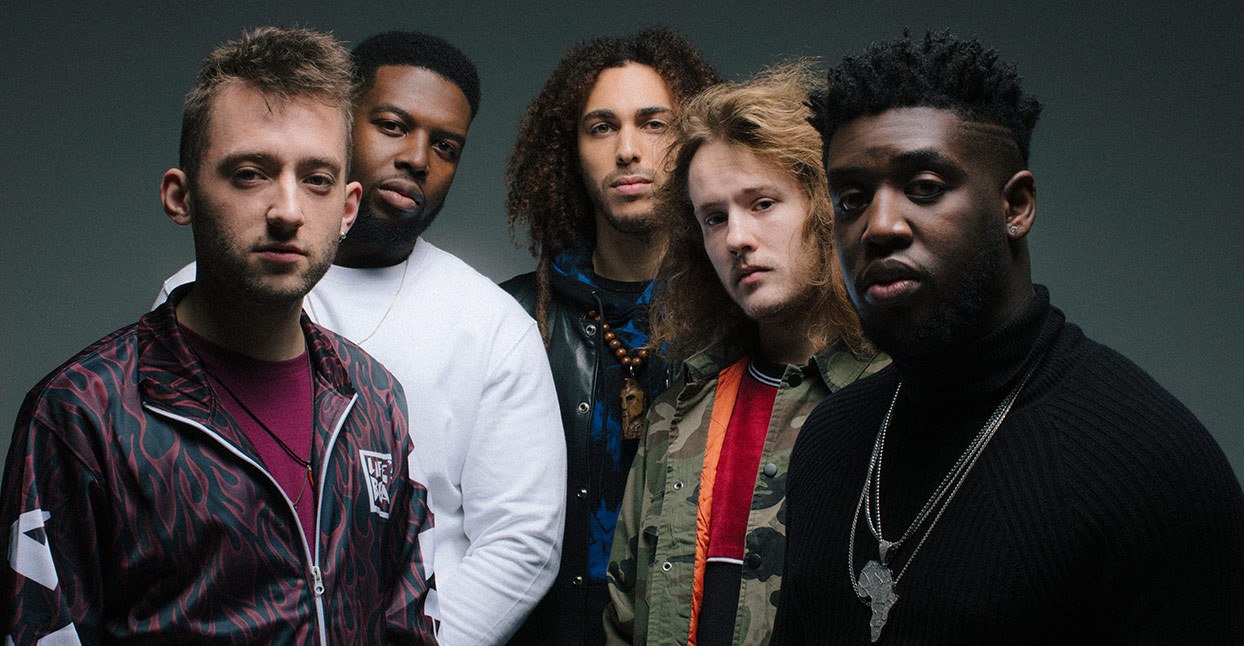Swing Time: Ezra Collective

A few of Tomorrow’s Warriors offer a groove-centric alternative to smooth jazz.
Ezra Collective has rather lofty goal. “I’m just trying to spread this music to the whole galaxy,” says Femi Koleoso, the band’s drummer. “Anyone who will receive it openly—we’ll play for them.”
For now, the London-based quintet, whose groove-centric instrumental jazz incorporates Afrobeat, hip-hop, grime, garage, reggae and funk alongside the more expected elements of bop and other jazz forms, is sticking to their home planet. The seven-year-old band of twentysomethings, whose name derives from a biblical figure, recently completed a short American tour that included stops at SXSW in Austin and packed gigs in New York, San Francisco and Chicago. But their reach, even at this relatively early stage of their career, extends far beyond the usual touring circuit—they’ve been called on to show audiences in far-flung places like Russia and others where jazz is heading.
“We played a jazz festival in Kazakhstan. It was incredible,” says bassist TJ Koleoso, Femi’s brother. “Prior to that, all I knew about Kazakhstan was Borat,” he jokes, referring to the Sacha Baron Cohen film and TV character. “I was expecting to see him at the airport. But it was the most beautiful time. We played in Russia prior to Kazakhstan; there was a DJ there who loved us. I was managing the band at the time, so you can imagine how disorganized it was. When I told the band we’re going to Kazakhstan, they said to me: ‘Look, you can barely get us to South London from North London.’ But it worked.”
If things seem to be happening speedily for Ezra Collective—they’ve just released their debut full-length album, You Can’t Steal My Joy, after putting out a pair of EPs—that’s just fine with them, and they’re ready to go where the music takes them. The five musicians—the others are keyboardist Joe Armon-Jones, Dylan Jones on trumpet and James Mollison on tenor sax—were friends before they were even a band, hanging out together at Tomorrow’s Warriors, a free youth club in London that focuses on providing jazz education. Since their early days, they’ve been sharply focused on exploring the different ways music can be experienced—and determined to have their own music heard. And a sense of community has always unified them.
“This is collaborative and inclusive music,” says Femi. “We don’t alienate anyone with what we do. That’s why, when you come to an Ezra Collective concert, the demographic is spread so far. You’ve got 70-year-old white dudes and 14-year-old black dudes in the same place. You don’t really get that anywhere else, the multi-age and multiracial.
“Everyone wants to be happy,” he adds. “People want to be joyful.”
It’s a sensibility that permeates the music on You Can’t Steal My Joy, and it’s palpable at their shows. While some audience members might choose to sit, stare and contemplate, the majority of Ezra Collective fans are typically on their feet, dancing frenetically to the band’s relentless rhythms. “You don’t have to teach someone how to move,” says Femi. “When you hear a certain track, your head starts bobbing.”
That enthusiasm and excitement is integral to the music. If there is a polar opposite of smooth jazz, then Ezra Collective is likely it. “That’s just not me, man,” says Femi about the more cerebral substrata of jazz, “not in any context of life. If I’m watching the football match, I’m jumping and screaming. If I eat food that I like, I’m jumping and screaming. I get told to be quiet more than I get told anything else. To be onstage in a suit just staring at someone intently, it’s not really us. When we realized that jazz wasn’t restricted to being like that, that’s when we became ourselves in the music.”
Being “ourselves” has grown into something of an unofficial motto for the band. And the new album’s title, You Can’t Steal My Joy (also the name of one of the mostly group-composed original tracks on the 13-song album, which includes covers of tunes by Sun Ra and Fela Kuti), is not random.
“For that hour or hour and a half that we are onstage and we’re playing, nothing else that’s happened matters,” says Femi. “We leave everything backstage and just remember the potential joy that music can bring out in each and every person. This album is really just a positive vibes album. You might be able to steal my ability to walk in certain areas of the world without being scared but, as long as I hold on to the core things that bring us together as humans, you can’t steal that away from us.
“Our aim is to always be ourselves, to remain best friends and to strive for bringing positive vibes to as many people as possible,” he reiterates. “How that happens, and what that sounds like, I couldn’t tell you right now. We’ll just see what happens and enjoy the process. That’s how we’ve always done it.”
This article originally appears in the Jun 2019 issue of Relix. For more features, interviews, album reviews and more, subscribe here.



















